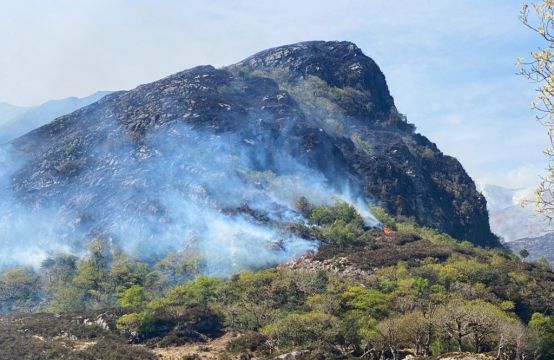Updated at 21:25
Additional reporting Vivienne Clarke
The three-day fire which raged through Killarney National Park since Friday night into Saturday is finally being brought under control this afternoon, with five helicopters currently at the scene, as questions remain about why the county's emergency plan was not activated on Saturday and why air support was limited.
As the Irish Examiner reports, Kerry’s chief fire officer Andrew Macilwaith said air support had been key to bringing the fires under control as five helicopters - three Air Corps helicopters and two private including one from Scotland - were at the scene on Monday.
A flyover by the Coastguard Rescue 155 helicopter earlier this morning had identified the fires that remained burning. The helicopter team would spend the rest of the afternoon dousing the natural woodlands including the ancient Tomies wood, Mr Macilwaith said.
Asked why air support had been limited to just one helicopter on Saturday, Mr Macilwaith said they had requested air support on the day, and one Air Corps helicopter was sent.
“We felt it was particularly bad yesterday and requested more,” the chief fire officer said.
On the ground, 30 fire personnel from Kerry, joined by personnel from Macroom, had fought the blaze alongside wildlife rangers and operational staff of the park and colleagues who arrived from throughout Munster.
Scene today
The scene at the park earlier on Monday was a lot better than on Sunday when there were three sections burning, Mr Macilwraith said.
A fire at a low-level sector where there are some of the oldest oaks in Ireland has been put out by ground crews who went across by boat with Killarney water rescue, he said.
Park rangers were delighted that fire crews “got in to protect the oak trees and they hope they will recover, they are some of the oldest in Ireland so that was excellent.
“The various life forms in the park that the rangers are concerned about — they will obviously be impacted, but at least the oaks hopefully will be saved which I think is a positive thing.”
It's looking an awful lot better this morning
There was still some burning this morning in the second sector at the top of the east ridge of Pepper mountain, Mr Macilwraith said.
“We have one helicopter already dispatched to that this morning — dropping water on it,” he added.
The fire officer said the area had burnt “down to a low level last night coming towards dusk time” and was “more or less extinguished” by 12.30am.
“Our fire crews have been there this morning and it's looking an awful lot better this morning which is excellent, so hopefully we'll be mopping up this morning.
“We've another helicopter coming from Inverness at lunchtime, and we've a third helicopter hopefully coming down from the Irish air corps — so with three helicopters and three or four ground crews we should hopefully put everything out today.”
Cause
Mr Macilwraith said it was very difficult to know what had caused the fire.
“When our crews arrived on Friday evening it was very well established at that stage... there was so much speed and the ground was so dry and very low humidity and for the last few days there's been no rain... everything was spreading very, very fast,” he said.
“It just shows it might have been something as small as somebody had a small barbecue or lit a small fire or something... a small ignition point like that when everything is so dry could just spread so far.”
The Chief Fire Officer along with senior figures from the Kerry Fire Service and National Parks and Wildlife Service are coordinating the response to the fire which continues to burn in Killarney National Park.
We thank them for their dedication and resilience #KillarneyFire pic.twitter.com/K4l5QHl33t— Kerry County Council - Comhairle Contae Chiarraí (@countykerry) April 25, 2021
Speaking on the same programme, Minister of State with responsibility for Heritage, Malcolm Noonan, said that tougher penalties for those who start fires will have to be considered.
The damage caused to biodiversity and habitats along with carbon emissions were all devastating, he said.
Mr Noonan said that 50 new park rangers would commence work shortly which would mean “more boots on the ground”.
There would also need to be a coordinated response by the Government this summer as more people would be “staycationing” which would require coordination of natural resources and parks.
There should be an enhanced role for the defence forces in rapid response for climate catastrophes, especially if there were a number of fires at the same time as had happened over the weekend, he added.
The environmental impact of the fires in Killarney would have to be conducted to assess the damage, Mr Noonan said. He expressed relief that the oak wood had been saved, but warned that important habitats including nesting birds had been damaged.
There would be damage to the soil and water that would have a deep impact for many years.







